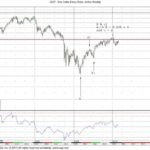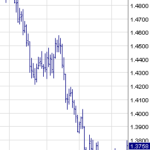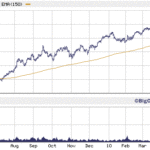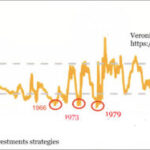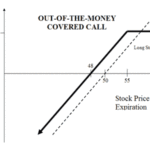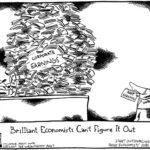Aprile 6, 2010 EcoAnemia
Il ritorno della saga ellenica
Iniziamo la disamina della giornata di ieri partendo dagli indici azionari USA, che all’unisono hanno raggiunto nuovi massimi annuali.
Il Dow ha raggiunto l’obiettivo in area 11000, tanto agognato nelle ultime settimane.
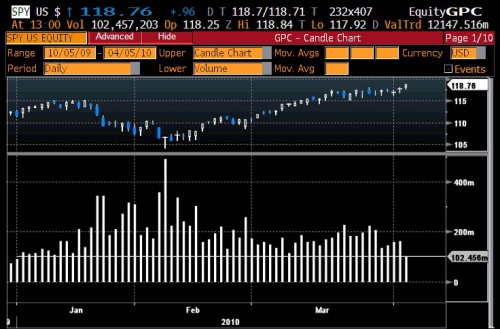
Lo Spoore idem, anche se i volumi di ieri sono i minimi dell’anno in corso (anche se sicuramente ha influito il fatto che in Europa era vacanza).
Ma è interessante notare l’andamento volumetrico proprio dello Spoore :
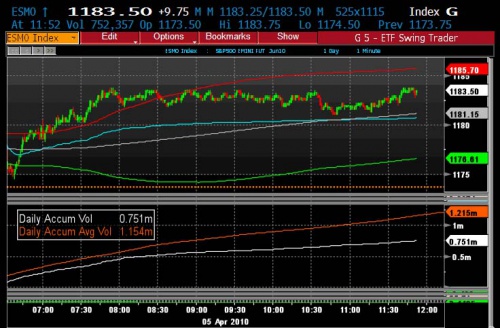
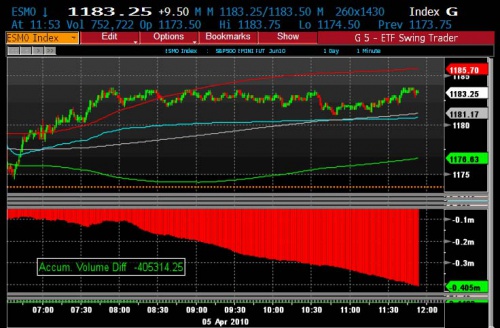
Volumi negativi (= azioni più vendute che comprate).
Non certamente un buon segno nel breve – come già sottolineato nel post di ieri, per altro, dato che pure la scorsa settimana ha presentato un saldo negativo – anche se il reddito fisso continua a cedere posizioni :
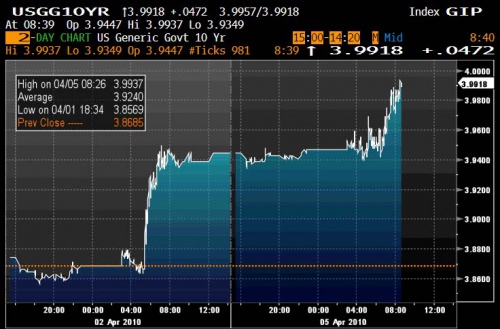
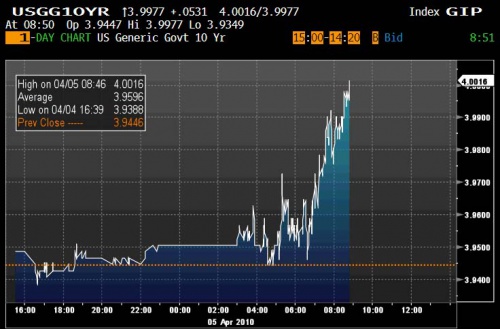
Implicitamente il 10Yr sta già anticipando un aumento dello 0.25% del costo del denaro, annuncio che ieri non c’è stato, a dispetto delle previsioni.
Da segnalare a riguardo un aumento anche del Freddie Fixed 30Yr Mortgage Rate : al 5.08%, ancora in aumento, un effetto della fine del QE :
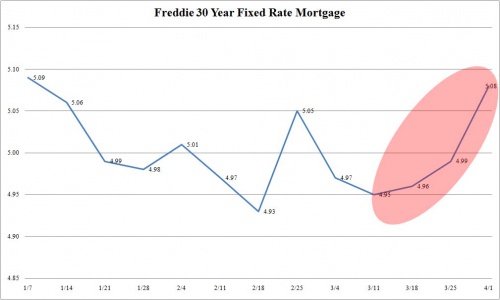
E le pressioni inflazionistiche iniziano a farsi sentire seriamente.
Nelle ultime due settimane i mass-media si sono apparentemente dimenticati della situazione greca.
Ma il mercato non dimentica proprio :
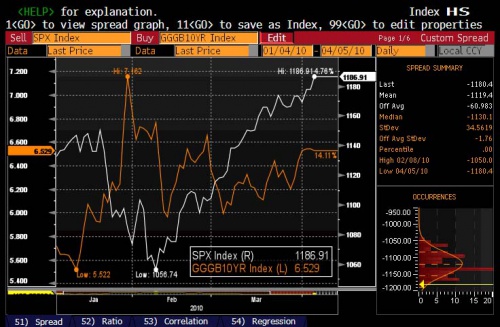
Siamo tornati ad un rendimento del 6.53%, da metà Marzo +.5% (+50 Bps).
Come mai è successo questo , nell’indifferenza generale (o quasi) ?
German disagreements with other eurozone countries on the shape of the Greek bailout are getting more acute by the day, and this is nearly a month after the European “bailout” has been announced.
La situazione è ancora più confusa di qualche settimana fa :
The latest lunacy out of Greece, as reported by Market News, is that the near-bankrupt country is now imposing its own conditions on the bailout, saying it wants to amend the deal struck recently by Eurozone lenders, and wants to bypass the IMF’s financial contribution, and eliminate the role of the IMF entirely, as it is “concerned that intolerably stringent conditions would be imposed by the International Monetary Fund in exchange for aid.”
Quindi i greci vorrebbero essere salvati alle loro condizioni ?
Verrebbe da dire : roba da matti.
Ma è tutto vero :
“The reason is that since the summit, [Greek] Prime Minister [George Papandreou] has been receiving information from the IMF about the possible measures and reforms it would be asking in exchange for financial support,” said one senior official. “The measures are tough and might cause social and political unrest. After that, various cabinet members voiced their opposition to the IMF contribution.”
Prendersi le proprie responsabilità per il disastro combinato i politici no ?
Ed infatti, il commento più appropriato appare questo :
What did Mr. G-Pap expect? That reducing a cash deficit of 16% to something like 3% was going to be as simple as downloading the latest Ricky Martin song to his iPad?
Ed addirittura, sentite un po’ con che toni il governo greco si rivolge all’UE, Germania in particolare :
The Greek Prime Minister has accused Germans of being “prejudiced and racist” in their treatment of Greeks
German citizens still see Greeks as lazy, and that Germans are resorting to “racially motivated” reasons to avoid providing a bigger helping hand to Greeks
Tedeschi razzisti ?
E perchè mai dovrebbero prendersi la briga di tassarsi internamente per salvare un governo che ha truccato i conti (ok, anche la Germania lo ha fatto e lo sta facendo, ma in maniera migliore evidentemente) ?
Ed in nome soprattutto di cosa ?
Nel frattempo, solite scene ordinarie dalla Grecia, classica fuga di capitali dal paese, già menzionata più volte :
Greek banks hit by wealthy citizens moving their money offshore.
Greek banks are being hit by a wave of redemptions as the country’s most wealthy citizens and corporations look to move their money offshore or to international financial institutions perceived as safer homes for their assets.
Un finale classico, così come la solita conseguenza :
“Greek banks won’t be able to increase lending volumes if deposits don’t increase, and a continued deterioration in their deposit base will lead them to cut back lending even more, stifling real economic growth.”
“Most bankers say they are worried about the stability of Greece and Greek banks.
This combined with the tax issue is making many people nervous about keeping their money in domestic banks or within the country


